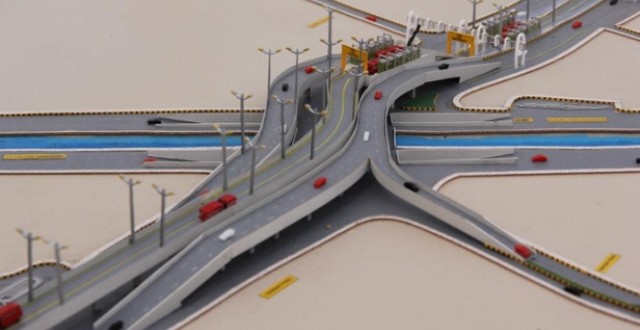The Central Development Working Party (CDWP) on Wednesday approved development projects worth Rs 130 billion including a CPEC scheme ‘Revival of Karachi Circular Railway’ and a Khyber Pakhtunkhwa government’s Peshawar Sustainable Bus Rapid Transit Corridor Project.
CDWP recommended the ECNEC to consider the approval of 7 mega projects in energy, transport communication, water resources and manpower sectors. The CDWP also accorded concept clearance to two projects including construction of Hyderabad-Sukkur Motorway (M6) worth Rs 238 billion, and Sindh Renewable Energy Development Project (SREDP) worth $ 122 million.
The meeting was chaired by Minister for Planning and Deputy Chairman Planning Commission Ahsan Iqbal. CDWP also reviewed two position papers of an ongoing project in education and water resources sector, worth Rs 64 billion.
In transport and communication sector, CDWP recommended four mega projects worth Rs 102 billion to ECNEC. The forum approved Revival of Karachi Circular Railway of Rs 27.6 billion, a project included in the China-Pakistan Economic Corridor framework during 6th JCC in Beijing, China last year on.
The project proposed by Sindh government envisages the revival and construction of 43.2 km double railway track, with 24 stations and procurement of 162 locomotors. The projected ridership is estimated at 550000 passengers per day in the opening year with projected demand of 749,541 till 2030.
The minister advised the Sindh government to coordinate with Punjab, in order to get benefits of its experiences in constructing the Orange Line Metro. “Cost of the project be rationalised and conditions of the foreign loans must be negotiated properly” the minister instructed. He also advised that the stations and other buildings are to be constructed under this mega project, must match the historical architecture of Karachi to ensure the beautification of this port city۔.
CDWP also approved Rs 56.8 billion Peshawar Sustainable Bus Rapid Transit Corridor Project of Khyber Pakhtunkhwa government. The project, planned to be constructed with a 48 billion loan of Asian Development Bank, envisages the construction of 25.8 km long road track, 32 stations with commercial building and other allied facilities. The project, planned to be executed in 12 months, is expected to facilitate 4, 72 000 people per day in the initial phase.
The minister instructed the officials of the provincial government to ensure construction of the stations and other buildings, aligned with the historical architecture of Peshawar. He also advised allowing separate enclosures for women and prayer room on the stations.
He expressed satisfaction over Pakistan’s metropolitan cities desire for adopting mass transit system. He highlighted that rail-based mass transit systems are being implemented in all the provincial headquarters under CPEC. He instructed for the formation of a joint forum where provincial governments could share its knowledge and experiences of developing urban transport system.
CDWP also approved a world bank financed Karachi Neighborhood Improvement Project (KNIP) worth Rs 10.5 billion. The project, proposed by the Sindh government, envisages improvement of roads, parks, government buildings and citizen services in the commercial hub of Pakistan.
The minister instructed the provincial government officials to ensure urban management in Karachi and prepare a long-term city master plan in line with Pakistan’s Vision 2025. He also said that the provincial government must prepare a clear plan for repayment of loans availed for KNIP.
CDWP also approved a Rs 7 billion project of construction of a 4–lane bridge across River Indus, connecting Kallur Kot Bhakkar with Dhakki area of Dera Ismail Khan. Iqbal instructed that the 14 km approach road to the bridge would be constructed by the government of Punjab.
In the energy sector, CDWP approved 30 MW Hydro Power Project Ghowari in Gilgit-Baltistan, with estimated cost of Rs 7.9 billion. It also approved 6 projects worth Rs 6.6 billion in water resource sector. The projects include construction of three dams in Pashin and Lorelai areas of Balochistan. This forum also recommended raising of Baran Dam Project worth Rs 5 billion to ECNEC.
CDWP also approved a project in the manpower sector, titled ‘Prime Minister’s Youth Skill Development Programme (Phase-IV) 2017-18’ with an estimated cost of Rs 6 billion. It also approved construction of a boundary wall of Zoo – Cum – Botanical Garden, Islamabad with a cost of Rs 109 million. Iqbal instructed to implement the project in line with prime minister’s directives.
CDWP approved three projects of the education sector worth Rs 3.16 billion, including establishment of National Facility for Laboratory Animal Research and Care (NFLACR) at PCMD, enhancement of the research facilities at the University of Veterinary and Animal Sciences (UVAS), Ravi Campus Pattoki (revised) and schools and college curriculum development.
In the agriculture sector, this planning body has approved a project of Strengthening/Up-gradation of Agriculture and Livestock Research System of Arid Zone Research Institute, Umerkot – Sindh with an estimated cost of Rs 643 million. The project of Mainstreaming Acceleration and Policy Support (MAPS) for Balochistan Sustainable Development Goals, worth Rs 500 million was approved by CDWP.
The forum also reviewed two position papers in the education and water resources sectors. It includes the extension of Right Bank Outfall Drain from Sehwan to the sea at Gharo (RBOD-II) 2nd revised with an estimated cost of Rs 61.6 billion. The minister instructed to speed up the work on this project in order to avoid any further delay. He also instructed to follow the Council of Common Interest’s (CCI) formula for flood protection projects wherein cost of such projects would be borne by the provincial and federal government on a 50/50 sharing basis.




